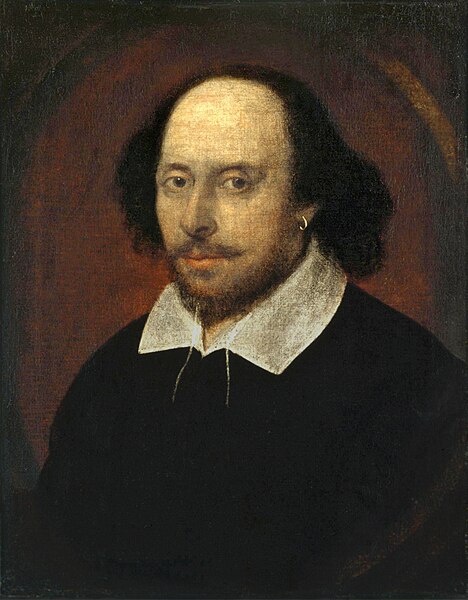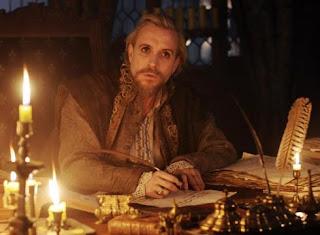 | |
| The Chandos portrait, artist and authenticity unconfirmed. National Portrait Gallery, London. |
HD International Trailer of Anonymous
William Shakespeare (baptised 26 April 1564; died 23 April 1616) was an English poet and playwright, widely regarded as the greatest writer in the English language and the world's pre-eminent dramatist -- or so we are told growing up.
 |
| Sir Edward de Vere, 17th Earl of Oxford |
The new movie that just came out, Anonymous, refutes that. We start with a CGI version of Elizabethan London. We are taken to the playhouse where a guy named Ben Jonson (an actual poet and playright) is directing his own play. In waltzes this middle aged man with a hanky in our next scene. The man walks into the theatre and sits down. He is intrigued by the play that is going on. He meets with Jonson after the play and we are introduced to the 17th Earl of Oxford, John de Vere. Who is this man and what does he have to do with Shakespeare and this Anonymous movie?
 |
| "William Shakespeare" |
Well, apparently there is another version of who Shakespeare really was. In short -- Shakespeare never wrote a word, is made to look like an uneducated actor who can only read but cannot write even one letter when put to the test. Jonson of whom we were talking about was supposedly first approached by the Earl who selected him to distribute his plays; which have been stacking up in his office for years. We see Jonson looking through the collection of plays which include, "The Tragedy of Romeo and Juliet" and "Julius Caesar". Now the claim that Oxford wrote all of these plays and that Shakespeare wrote nothing was droned up by the fact that the Earl of Oxford was of nobility; he was raised to become an educated man among the court of Elizabeth I. Shakespeare was basically a "peasant" of the land.
 |
| Shakespeare crowd surfs after his successful debut |
The whole movie paints Shakespeare as an idiot who is a complete fool, is conniving, and money hungry. In one scene, after finding that Jonson has been getting his plays from Oxford he appears at Oxford's home and threatens to expose him unless he is paid money and given credit for Oxford's work. Oxford, who said he has "no wisdom" agrees. With that, some of the greatest works of "Shakespeare" or should we say "Anonymous" are brought to light and introduced to the stage. Shakespeare starts to work on the productions and all he has to do is walk out in front of the audience at the end and bow; then he can lay back and enjoy the money he's getting from Oxford to upkeep the deal. Shakespeare is even shown bringing an official coat of arms that was granted to him into a pub, which "cost a lot", but he had to have it to make himself "official". Funny thing is -- his motto -- "Non sans droict" meaning "Not without right." When Shakespeare tries to pronounce the last word he is caught fumbling; Jonson who is present has to finish and translate for the tavern folk who are questioning "what is that?" (coat of arms) If I'm not mistaken, I believe it was Shakespeare's father who was granted the arms in the first place?
 |
| Young Queen Elizabeth with Edward de Vere, Earl of Oxford |
Anywho, the movie also revolves around the "love story" of Oxford and Queen Elizabeth. We have the young Oxford who is living under the wardship of William Cecil. Cecil gets Oxford the best tutors in all of Europe and Oxford still persists in writing poetry which is seen as the "devil's work" in Cecil's eyes. Oxford, while at court, attracts the interests of the young Queen played by Joely Richardson. The two dance and then fast forward through the love making we have Elizabeth who is now with child "again" apparently. She demands that she be allowed to marry him. Cecil quarrels with Elizabeth and sends her off to have the child, who is the bastard of Oxford obviously -- Cecil tells Oxford that he is to never see Elizabeth again and yada yada must go back to his wife, who is coincidentally Cecil's daughter, Lady Anne. Oxford is so insulted and angry that he writes a play making depicting Cecil as the character Polonius in Hamlet.
We then get into the later years where Cecil seems to have developed a faction against his own son-in-law (Oxford), the Earl of Southampton, and the Earl of Essex, Robert Devereux. William dies, but passes on everything he knows to his son, Robert. By this point, Jonson, oh yeah remember him? Jonson makes it a point to report the play Richard III and how it is possibly depicting Sir Robert.While the play is debuting, Robert Cecil feels that his character like his father before him is being made fun of by making Richard III a hunchback. It is also during this time that Oxford decides to write a book recounting the love affair he had with the queen so that she will invite him to court; a subplot to get Essex and Southampton into see the queen. Essex, along with Southampton are found out and put in the Tower.
 |
| The late Queen Elizabeth agrees to meet with Oxford once more... |
Because of the book written by Oxford -- she decides that she would like to meet with him again. In comes Cecil, to spoil her newly found affections for Oxford again -- she is told that Southampton is actually her child.
 |
| Henry Wriothesley, 3rd Earl of Southampton and his supposed father, the 17th Earl of Oxford |
As the Earl of Oxford watches Essex and Southampton being ambushed -- he is also approached by Sir Robert Cecil who starts to talk about what his father told him before he died. "My father told me all of his secrets." Ok, creepy! Turns out that when Elizabeth was about 16 or 17 (can't remember exactly), under the rule of "Bloody Mary" and yes he uses those very words.. Elizabeth becomes with child and has her first bastard. One of many to follow. What Oxford is not aware of is that HE is that child and that he has committed incest with his own mother -- whow, flashbacks of Anne Boleyn and Mary Boleyn inserted here -- in fact Cecil even made a comment about the Tudors and their selection of sexual partners were not always "the best". Anywho, Oxford, who is in disbelief and is sickened by the very thought, is also informed that Southampton is his son by the queen. Cecil goes on in his monologue about how Oxford was taken on by his father so that he might marry his daughter and father the next heir to the throne since Oxford was the first bastard of the queen... I know right.. I'm a little weirded out and lost as to how off track the plot got. Oxford finally sees the queen who has no idea that Oxford is her son -- Oxford begs for their sons life and it is granted after she scolds him and tells him that none of his works will ever bear his name.
 |
| Vanessa Redgrave as Queen Elizabeth I |
The queen continues to age and Cecil is determined to put James of Scotland on the throne -- in her last days an Act of Succession is written up naming James as the heir to the throne. Cecil approaches the dying queen who is staring off into space -- insists that she sign the decree -- she takes one look at it, sees James's name, and tosses it to the floor. Wham, Elizabeth is dead and James is proclaimed king of England.
As Oxford is on his death bed, he calls Jonson to him -- he hands over everything he has ever written and tells him to publish is a few years after the Earl has passed on. Jonson agrees and leaves with a stack of plays, sonnets, and poems. He is stopped by Anne, the Countess of Oxford -- who again relays the feelings of the Cecil family -- plays are the work of the devil and he won't be remembered for anything. Jonson politely, in what we call in our time, cusses her out and that's that.
What makes the movie worth seeing --
- The plot is crazy and hard to follow at times, but is a magnificent attribute to Historical Fiction once again. The flashbacks between times was a bit much but it was interesting to see a mother and daughter portray the same person.
- Joely Richardson who just wrapped up playing Queen Katherine Parr in "The Tudors" portrays a queen not unlike Queen Katherine herself. The rage of the queen and that of her father is there and her temper flares more than a few times but we also see the romantic side of Elizabeth and her enjoyment of the arts.
- Vanessa Redgrave is also wonderful in her roll as the elder queen, a woman who has aged and is becoming somewhat mentally unstable but is still enjoying life.
- The costumes -- were amazing as usual. Period costumes amaze me; yes there were some items and clothes re-used from "The Tudors" and other Elizabethan movies.
- The CGI reproduction of London was amazing! The original London bridge was portrayed, we are talking the only bridge that existed back then. There are also lovely scenes of stately homes -- and they made a reproduction of I believe it was Hampton Court. The best scene of all -- Elizabeth's funeral. It was portrayed exactly as it is shown in the famous drawing. They zoomed in from the sky to I believe it was the frozen Thames -- thousands of people were lined up to see the queen pass by. Every detail -- including the flags was there and was rather astonishing.
 |
| London, England c. reign of Elizabeth I |
 |
| Funeral procession of Queen Elizabeth I |
- And the last thing I liked -- the music although some of it was taken from the movie Elizabeth (1998); i.e. Mozart's Requiem "Introitus: Requiem aeternam" and "Knight of the Long Knives" after William Byrd. The "love theme" of Elizabeth and Oxford was quite beautiful. Tracks I liked include "Hamlet in the Rain", "God Save the Queen", "Edward's Theme", and "The Other One" -- two tracks reminded me so much of Elizabeth's (1998) "Coronation Banquet" by David Hirschfelder -- that was "Play after Play" AND "Will's Triumph". Music can make or break a movie -- I think the whole repeatative nature of using Mozart and Byrd was rather unoriginal and felt like it was almost done on purpose. The other themes.. well.. sounded just like Elizabeth (1998) -- there were only a select few tracks that had originality. Eh, soundtrack C+.


No comments:
Post a Comment